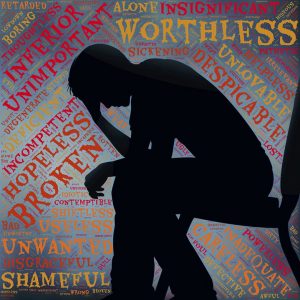Having mental health challenges does not mean you are crazy, but it could mean you are experiencing undue stress or depression. Often this is overlooked on campuses because stress just seems to be part of the curriculum. A little stress gets things done. A lot of stress is counterproductive and can lead to serious health issues.
College students face a whole host of concerns and challenges while attending college. The most talked about is the rising cost of tuition. However, the more serious issue of students' mental health needs a closer look. Left untreated, these issues can become debilitating and even life-threatening.
Luckily for Christians, we have direct instruction from God to rest and tell him our troubles.
28 Come to me, all who are weary and burdened, and I will give you rest. 29 Take my yolk upon you and learn from me, for I am gentle and humble in heart, and you will find rest for your souls. 30 For my yolk is easy and my burden is light. Matthew 11:28-30
Even so, mental illness is very common among students today. According to mental health research conducted by the National Alliance on Mental Illness (NAMI):
- One in four students have a diagnosable illness
- 40% do not seek help
- 80% feel overwhelmed by their responsibilities
- 50% have become so anxious that they struggled in school
Related: Avoid College Burnout
The 5 Most Common Forms of Mental Health Challenges
College students today are more likely to suffer from depression, anxiety, suicide, eating disorders, and addiction than other forms of challenges. Unfortunately, it is not talked enough about but we are here to help.
At Great Lakes Christian College, we recognize these challenges and face them head-on. Our community and culture are supportive and closely knit. Professors, students, and staff engage on a daily basis and look out for one another. GLCC provides both traditional trained counselors and A Peer Support team made up of trained peer counselors.
At Bible colleges and Christian colleges, students have the added assurance that the support they receive from counselors, professors, mentors, and peers comes from a place of God’s love. Nevertheless, some students still struggle.
Here are some ways to combat the most common struggles college students face today.
Depression
Depression among college students comes in many forms. It is the number one reason students drop out of school. Sometimes depression is temporary and linked to a specific event, like a great loss. Other times it is hard to pinpoint the cause. Regardless of the reason for depression, if left untreated it could lead to other symptoms or even suicide.
Depression is a common, but an extremely serious illness that leaves you feeling despondent, sad, helpless, and completely detached from the world.
Depression can interfere with everyday life, making things like working, studying, sleeping, and eating seem difficult. An important thing to remember is that depression is a disease that needs to be treated. It most likely will not go away on its own, and typically gets worse when left untreated. It is is the most common mental disorder and maybe the least talked about.
Signs of Depression:
- Sadness
- Anxiety
- Irritability
- Lack of interest in things you once enjoyed
- Pulling away from your social life
- Can't concentrate
- Insomnia (trouble falling and staying asleep)
- Lots of guilt or feeling worthless
- Loss of energy, or fatigue
- Changes in appetite
- Observable mental and physical sluggishness
- Thoughts of death or suicide
If you feel you are experiencing depression please seek help. Talk to a trusted friend, teacher, advisor or parent. We are all here to help you.
Anxiety
All college students experience low levels of stress and anxiety. In fact, all adults do too. It is a fact of life. However, anxiety becomes a problem or disorder when it interferes with your daily life, preventing you from functioning properly, and causing an unexplained amount of stress and fear.
Symptoms of anxiety disorders can be mistaken for normal stress or justified by simply saying someone is "worrying too much." It is important to pay attention to the signs in yourself and those around you.
To make it even more complicated, symptoms manifest differently in each person, so what is true might not necessarily be true for someone else.
Common symptoms for anxiety disorders may include:
- Feelings of stress and apprehension
- Irritability
- Trouble concentrating
- Fearfulness
- Sweating and dizziness
- Shortness of breath
- Irregular heartbeat
- Muscle pain and tension
- Headaches
- Frequent upset stomach or diarrhea
Recognizing anxiety disorder signs in others can be difficult because symptoms can seem like normal stress or anxiety. Also, people experience stress differently.
For example, your friend may be suffering from an anxiety disorder if they:
- Have experienced a tragic event and do not develop healthy coping habits
- Appear to live in constant fear of failure, academically or socially
- Are uncomfortable and extremely anxious in social atmospheres
- Have trouble concentrating or seem to have a blank mind
- Seem plagued with guilt or stress
- Have visible panic attacks
What can you do if you notice or suspect someone has anxiety issues?
- Be an active listener when they are feeling stressed or anxious
- Help them research the next steps they should take
- Avoid criticizing or belittling the severity of their symptoms
- Encourage them to try coping strategies
- Encourage your friend to visit a campus health care center and discuss their troubles with a professional.
If your friend is really suffering but resisting help, consider consulting a mental health care provider for suggestions for moving forward.
Suicide
Suicide is very tragic and scary. It can affect an entire community, including the victim's friends, family, co-workers, and teachers. It is not something to be taken lightly and people who are suffering from suicidal thoughts need compassion and care to overcome their struggles.
Every college student experiences moments of stress, doubt, sadness, and frustration. However, a suicidal person could be very intense about the feelings and possibly express their feelings about ending their life.
Always take any mention of suicide seriously. Other signs to watch for include:
- Expressing feelings of being trapped
- Feeling as if they are a burden to others
- A fluctuation in moods including (but not limited to):
- anxiety
- irritability
- loss of interest in things, activities and objects they enjoyed before
- humiliation
- rage
- depression
- Giving away possessions they love
- Withdrawing from friends and family
- Inexplicably visiting people to tell them goodbye
- Searching online for ways to commit suicide
- Sleeping poorly or way too much
- Reckless behavior
- Aggression
- Increasing their use of drugs and alcohol
What Should You Do if You Start to Notice Suicidal Behavior in Your Friend?
- Ask them directly if they are thinking about killing themselves.
- If they say yes, ask them about their plan. Having an insight into how they plan to kill themselves allows you to look for ways to make the environment safer.
- Listen. Let them talk about it without offering judgment. Sometimes people just want to be heard.
- Encourage them to call the National Suicide Prevention Lifeline’s number (1-800-273-8255) or visit the campus health department.
- Stay in contact with them. Check in with them and visit them often.
Eating Disorders
Many college students (both men and women) develop eating disorders during college. When left untreated, eating disorders can result in mental and physical issues that can be life threatening. For example, kidney failure, stunted growth, loss of menstruation, reproductive issues, and heart problems.
Even though men are almost as likely to develop eating disorders, they are much less likely to seek treatment. Here are some ways to recognize the signs of eating disorders such as anorexia, bulimia, and binging:
- Distorted or poor body image
- Excessive exercise
- Irregular heartbeats
- Dehydration
- Feeling like eating is out of control
- Fear of eating in public
- Constantly making excuses for eating habits
Here are some signs to look for:
- Is your friend skipping meals or only eating small portions?
- Is your friend suddenly uninterested in foods they once loved?
- Is your friend limiting their meals to foods very low in calories?
- Is your friend taking diet pills excessively or medication that suppresses hunger, such as Adderall or Ritalin?
- Does your friend disappear suddenly to the restroom after meals?
- Are your friend’s teeth noticeably stained?
- Are they using mints after trips to the bathroom or perfume to mask the smell of vomit?
If you are concerned that a friend may have a an eating disorder or are concerned about yourself, here are some resources to learn more about it and get help.
National Eating Disorder Association (NEDA)
National Association of Anorexia Nervosa and Distorted Disorders (ANAD)
Academy for Eating Disorders (AED)
American College Health Association (ACHA)
Addiction
Drug and alcohol use and abuse is prevalent on college campuses. Casual and social use can very quickly turn into an addiction.
Things to look for:
Those who do become dependent on alcohol or drugs could show signs such as the following:
- Slurred speech, bloodshot eyes, or impaired coordination
- Fear, anxiety, or paranoia for no apparent reason
- Prone to suspicious behaviors, frequently get into fights or trouble with the law
- A sudden need for money or financial crisis
- Built tolerance for alcohol and drug use; user needs to use more of the substance to obtain the same effects
- Deterioration of physical appearance, such as weight loss or gain, and change in personal grooming habits
- A sudden change in friends, activities, or hobbies
What to do if you think you or a friend has an addiction
Addicts get good at trying to hide their symptoms, or downplay them. Even though it can be difficult to address a friend it is important to do so. The earlier an addiction is address the better chance of recovery is.
Address your friend when they are sober and explain your concerns and what you have noticed. Refrain from being accusatory or judgemental. Instead, emphasize your concerns and remind them how positive and productive they are when they are not under the influence.
Offer to go with them to seek treatment at your student health center, and consult resources online.
National Institute for Drug Abuse
Substance Abuse and Mental Health Service Administration (SAMHSA)
National Council on Alcoholism and Drug Dependence (NCADD)
We hope this has helped
At Great Lakes Christian College we take the health and well being of every student and staff member very seriously. We are all children of God and it is our responsibility to care for one another. You will find immense support, caring and love in our close knit community at GLCC.
Want to find out more?
We can't wait to hear from you!
If you are interested in finding out more about GLCC or to schedule a tour there are several ways to contact our Admissions Department.
Call our toll free number: 1-800-YES-GLCC
Email:admissions@glcc.edu.
Text this number with your question and one of our admission counselors will be glad to respond, 517-292-4522.
Click here to find out more about Online Courses.





